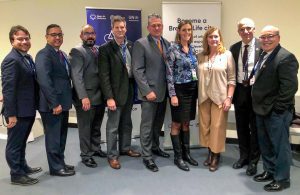Inclusiv Center for Resiliency and Clean Energy
Virtual Solar Lending Professional Training and Certificate Program
We are currently accepting applications for our virtual Solar Lending Professional Training and Certificate program. This training is designed for individuals with more than one year of lending experience who work at community-based lending institutions (credit unions, CDFIs, and community banks). This training series has been developed by the Inclusiv Center for Resiliency and Clean Energy and the University of New Hampshire Carsey School of Public Policy Center for Impact Finance, with major funding from the U.S. Department of Energy Solar Energy Technologies Office.
The cohort-based series offers two tracks: Consumer Solar Lending and Commercial Solar Lending. Each training course will last for seven to eight weeks and will be offered multiple times a year. The training will provide participants with the practical application skills and tools needed to design and implement (or refine) solar lending programs at community-based lending institutions. Each cohort will participate in a combination of weekly, instructor-led, live Zoom sessions and self-paced lectures and homework assignments. Upon successful course completion, participants will earn a Solar Lending Professional Certificate.
To apply, please visit: https://carsey.unh.edu/center-for-impact-finance/solar-lending-training-series
To learn more, please contact Neda Arabshahi, Director of the Inclusiv Center for Resiliency and Clean Energy, at NArabshahi@inclusiv.org.

Pictured L-R: José Julián Ramírez, Asociación de Ejecutivos de Cooperativas de Puerto Rico (ASEC); Eddie Alicea, Cooperativa Sagrada Familia; Aurelio Arroyo, Cooperativa Jesús Obrero; Garret Sisco, Lake Trust CU; Kris VanBeek, USALLIANCE FCU; Cathie Mahon, Inclusiv; Pam Agnone, UNFCU; Eric Darmanin, UNFCU; and Pablo DeFilippi, Inclusiv
The Inclusiv Center for Resiliency and Clean Energy, created in partnership with the Center for Impact Finance at the Carsey School of Public Policy, University of New Hampshire and the Hewlett Foundation, is designed to build a network of credit unions committed to jointly designing and scaling solutions to climate change, with a goal of promoting affordable and sustainable energy for all people.
Credit unions have a critical role to play in helping communities become more prepared and resilient in the face of natural disasters like hurricanes, super-storms, floods, fires and drought. Emergency preparedness plans are in place in every credit union to protect the integrity of members' accounts and to afford access to cash in a crisis. Many credit unions in areas affected by weather-related events have started to help their members prepare for crises through financial education and counseling and encouraging saving for an emergency.
Though climate change affects all of us, severe weather events can have an outsize impact on people and communities least able to withstand them. In the aftermath of recent natural disasters, credit unions have been among the first to open their doors and provide cash to their members even when their own systems were impaired.
Credit unions can also play in addressing the root causes of climate change, while working together at the national and international level to slow global warming investing in new, sustainable and green solutions.
As financial cooperatives committed to investing in strong and healthy communities, credit unions are uniquely poised as vehicles for change; to deploy capital to local community solutions toward (seemingly) intractable problems with:
- Scale: Just under 6000 institutions nationally, serving roughly 100 million consumers, credit unions are an underutilized resource to drive change in consumer behavior.
- Footprint: Credit unions have presence in rural, urban and suburban communities all over the country and can lead and drive local change through initiatives they champion.
- Community connection: Credit unions are locally owned and controlled; governed by residents of the communities they serve. This ensures that they design their products according to local demand and structured for success.
What credit unions offer
- Financing capacity: Credit unions have a wide range of loan products for consumer, business and home mortgage loans that can be refined to support clean and renewable energy options.
- Flexible and innovative lending approach: Credit unions (particularly CDCUs) have experience working with multiple partners to package and deliver opportunities financing. CUs often package lending with financial counseling and coaching to help borrowers get across the finish line.
- Impact investing opportunity: With almost half are low-income designated, able to accept capital from outside their communities, there is large opportunity to channel socially responsible investment interested in climate change solutions toward credit unions.
Goals of our initiative
- Build a network of credit unions and other community financial institutions to understand and seek solutions to climate change.
- Together design financial products to support capacity and access to renewable and clean energy solutions for consumers, homeowners and business.
- Develop and disseminate training to support the growth and expansion of clean energy financing products and services.
- Establish loan participation and/or secondary market opportunities to fuel growth and collaboratively build clean energy financing business.
Watch Cathie Mahon, CEO of Inclusiv, present at the Better Banking Webinar with Green America:

